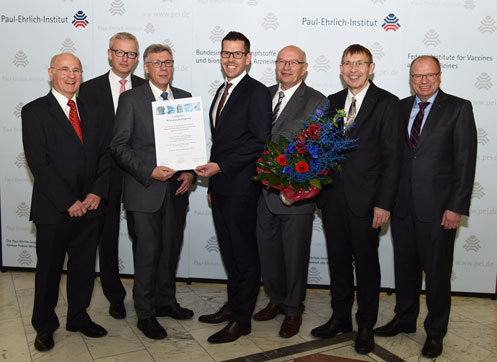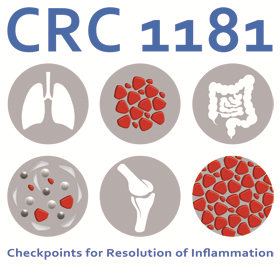Garbage sorting in the body – outstanding research work honoured

Prof. Dr. Gerhard Krönke received the Langen Science Prize of the Paul Ehrlich Institute
How does the immune system decide which cells are good and which are evil? This distinction is of central importance, because some belong to their own organism, while others must be attacked and disposed of. Prof. Dr. Gerhard Krönke, senior physician at the Deaprtment of Internal Medicine 3 – Rheumatology and Immunology (Director: Prof. Dr. med. univ. Georg Schett) of the University Hospital Erlangen together with his working group made an important contribution to this field. Now he received the Langener Wissenschaftspreis of the Paul-Ehrlich-Institute for his work. The prize is awarded to researchers who have significantly expanded their knowledge of autoimmunity in rheumatology, clinical immunology and infectious diseases.
The immune system defends against pathogens by attacking, eliminating and disposing of them. But how does the differentiation between own good and foreign harmful cells work? This is an important question, because if this differentiation mechanism does not work properly, the body is sometimes directed against itself and autoimmune diseases can develop. A research group led by Prof. Krönke and his team was able to show that the immune system is controlled by different types of macrophages, which take over a sort of waste separation in the body. Tissue macrophages recognise dead cells of their own organism and dispose of them without any further effects. Inflammatory, i. e. inflammatory, macrophages, however, detect non-body pathogens and initiate a reaction to fight the intruders, for example through inflammation and an immune response. In this way,”good” and “bad” waste can be processed separately.
Knowledge of these different degradation processes is crucial for further work in the field of autoimmune diseases. In the future, anyone who understands how cell differentiation works in a healthy body could also explain what goes wrong when the body acts against itself and which processes lead to the development of autoimmune diseases such as rheumatoid arthritis.
Further Information:
Prof. Dr. Gerhard Krönke
Phone: +49 9131 85-33015
E-Mail: gerhard.kroenke uk-erlangen.de
uk-erlangen.de
